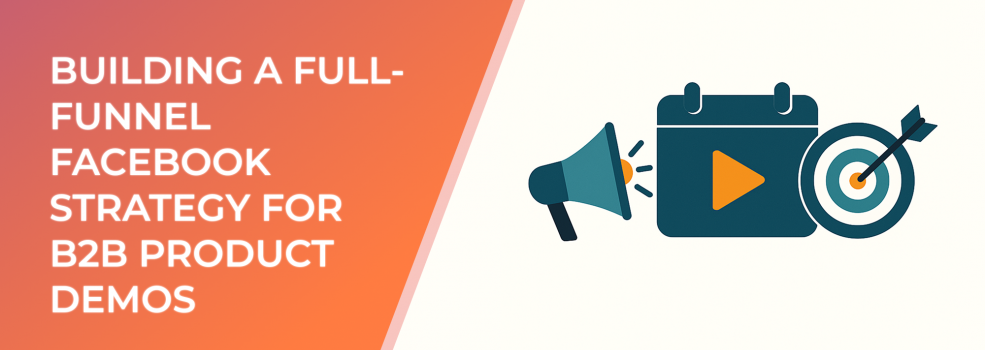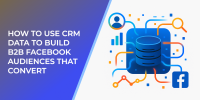Product demos are often the tipping point between curiosity and commitment in B2B sales. Research shows that 77% of B2B buyers view a demo before making a purchase decision, and companies that prioritize demo requests see a 20–30% higher conversion rate compared to those relying on gated content alone.
A strong Facebook funnel can bring high-quality prospects from awareness all the way to demo booking, while keeping costs per lead under control.
Step 1: Awareness – Building the Right Audience
A full-funnel Facebook strategy for B2B product demos—from awareness to post-demo retargeting
At the top of the funnel, your goal is to generate awareness and attract the right decision-makers. Here’s how:
-
Target by Job Titles and Industries: Facebook allows detailed targeting to reach roles like IT managers, operations directors, or marketing leads.
-
Lookalike Audiences: Build lookalikes from existing demo attendees or high-value customers to expand reach.
-
Educational Content: Promote case studies, industry reports, and explainer videos that highlight problems your product solves.
This phase is not about hard selling. Instead, it’s about lead generation through offering value and capturing attention.
Step 2: Consideration – Nurturing Engagement
Once you’ve captured attention, move prospects toward demand generation and intent:
-
Retarget Website Visitors: Use custom audiences to retarget users who engaged with your top-of-funnel content.
-
Video Retargeting: People who watched at least 50% of your explainer videos are prime candidates for the next step.
-
Lead Ads for Resources: Offer in-depth guides or webinars in exchange for contact details. This keeps your B2B lead generation machine active while building trust.
According to HubSpot, nurtured leads make 47% larger purchases than non-nurtured leads. Facebook retargeting ensures that warm prospects don’t slip away.
Step 3: Conversion – Driving Product Demo Requests
At the bottom of the funnel, your campaigns should focus on direct response advertising to get prospects to book a demo:
-
Lead Ads for Demo Sign-Ups: Create instant forms with pre-filled fields to reduce friction.
-
Conversion Campaigns: Optimize for “Completed Demo Request” events rather than clicks.
-
Social Proof: Use testimonials, client logos, and case studies to reinforce credibility.
The key here is clarity. Your call to action should be direct: “Book Your Free Demo Today.” A strong incentive, such as a limited-time consultation, can increase urgency.
Step 4: Post-Demo Retargeting
Don’t stop at the demo. Retarget those who attended but didn’t convert:
-
Follow-Up Offers: Share ROI calculators, comparison charts, or limited-time offers.
-
Account-Based Marketing: Build custom audiences for key accounts and run tailored ad campaigns.
-
Email + Facebook Integration: Sync your CRM with Facebook Custom Audiences to reach prospects across channels.
This phase ensures you’re maximizing ROI on every demo request.
Useful Statistics to Guide Your Funnel
Typical conversion drop-off through the full-funnel—from awareness to post-demo conversion
-
41% of B2B buyers consume 3–5 pieces of content before talking to sales.
-
Facebook accounts for 25% of all social referrals to B2B websites.
-
Retargeted ads can increase conversion rates by up to 150%.
These numbers show why a full-funnel approach is critical. Each stage builds momentum toward conversion.
Related LeadEnforce Articles You Might Like
If you found this helpful, check out these articles from our blog:
-
Running Retargeting Campaigns for Restaurant Takeout or Online Orders
-
Why Your Lookalike Audiences Underperform (And What to Do About It)
Final Thoughts
A Facebook full-funnel strategy for B2B demos combines awareness, lead nurturing, and direct demo requests into a seamless buyer journey. By using smart targeting, retargeting, and lead generation tactics, B2B marketers can significantly increase demo bookings and accelerate sales cycles.
With tools like LeadEnforce, you can take this even further by targeting people who follow specific Facebook groups and Instagram pages—helping you zero in on the exact audience ready for your demo.

